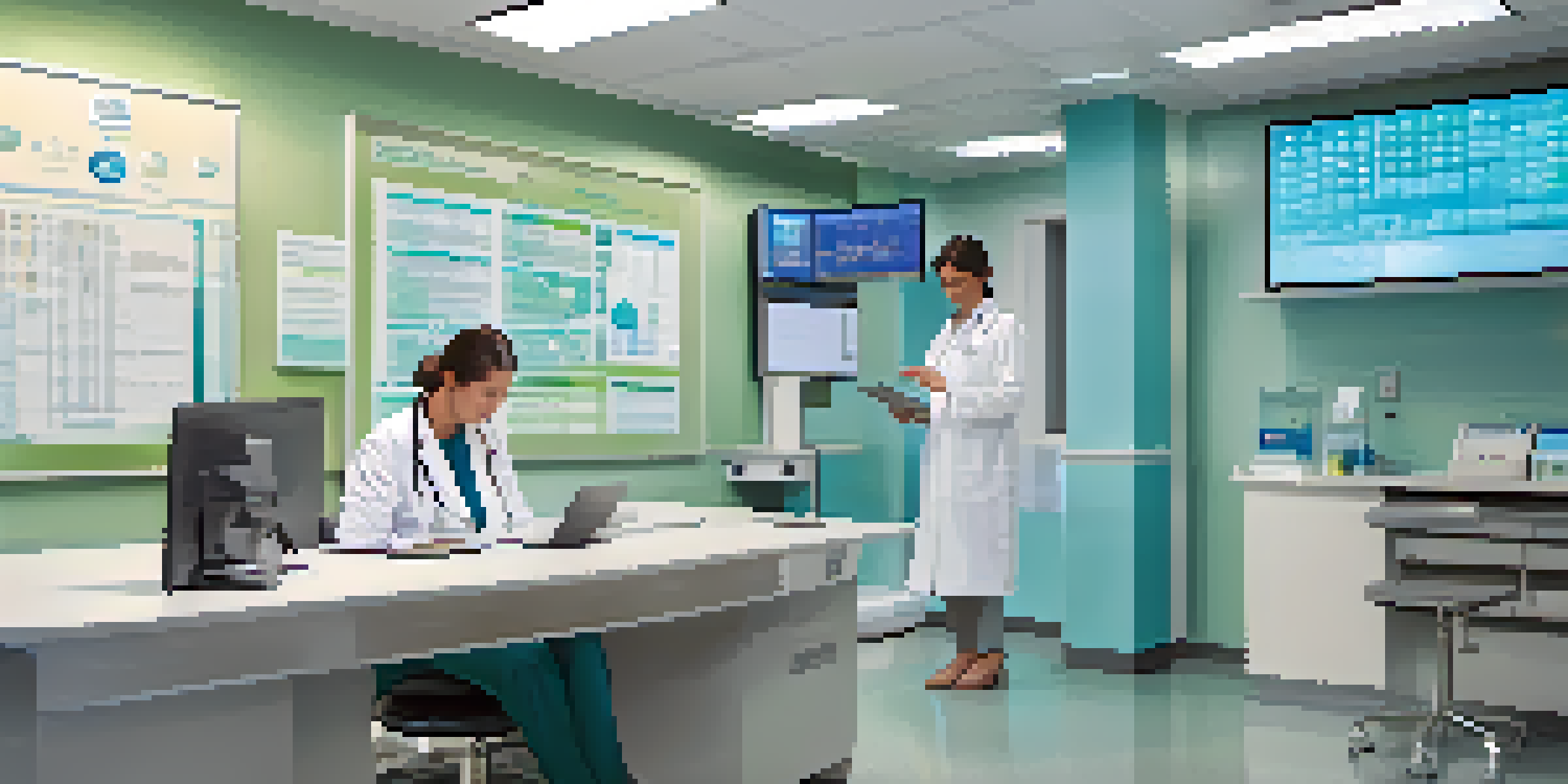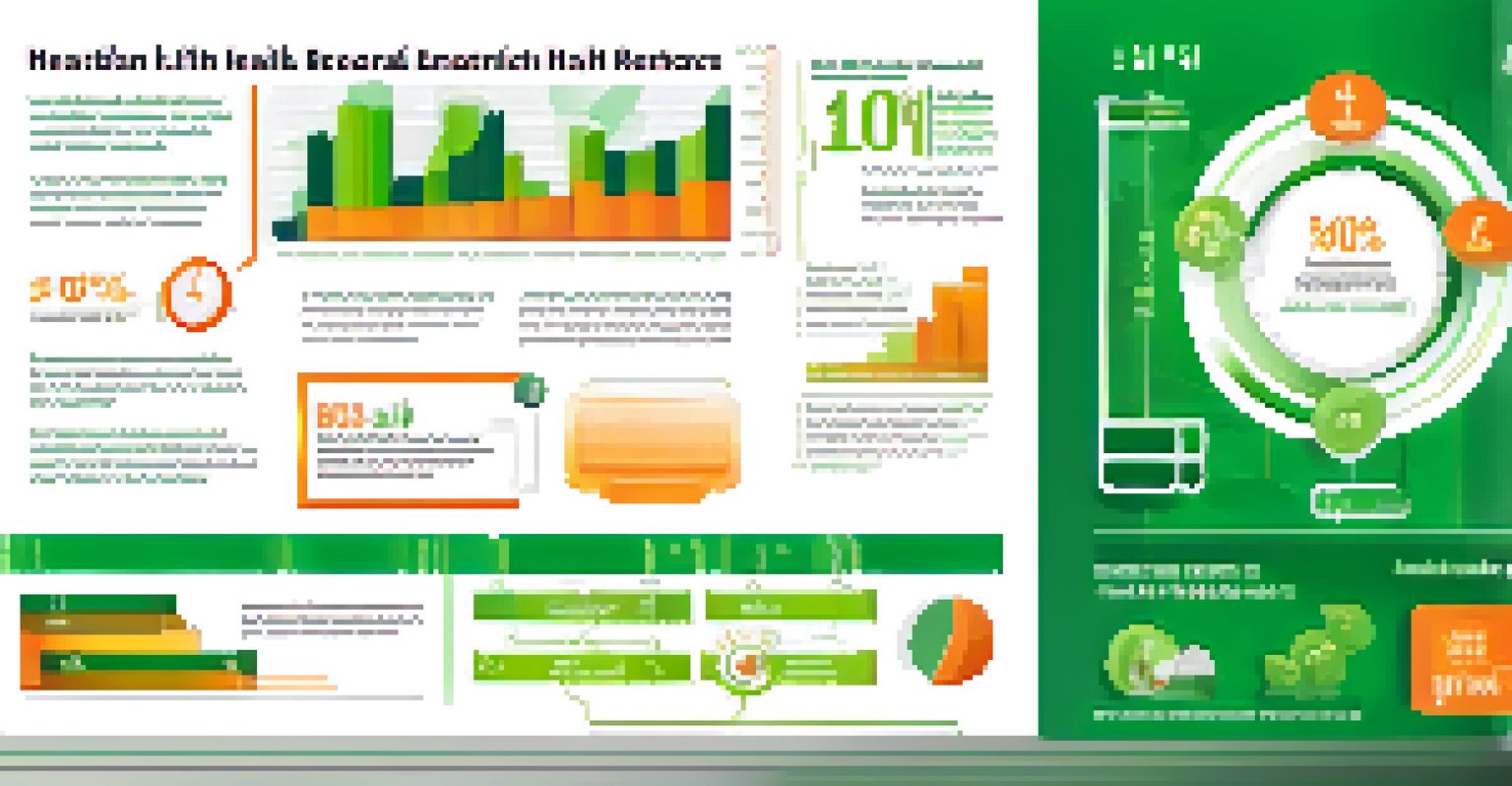The Impact of EHRs on Healthcare Costs and Efficiency

Understanding Electronic Health Records (EHRs)
Electronic Health Records, or EHRs, are digital versions of patients' paper charts. They contain a patient's complete medical history and can be accessed by authorized healthcare providers. Think of EHRs as a central hub where all patient information is stored, making healthcare more organized and efficient.
The greatest benefit of EHRs is the ability to access patient information anywhere, anytime, which transforms healthcare delivery.
EHRs not only streamline record-keeping but also enhance the quality of care. By providing real-time access to patient data, EHRs enable healthcare providers to make informed decisions quickly. This can significantly reduce the likelihood of errors that often occur with paper records.
Moreover, EHRs facilitate better communication among healthcare teams. When everyone has access to the same information, it fosters collaboration, which is crucial for effective patient care. In this way, EHRs are transforming how healthcare is delivered.
The Financial Impact of EHRs on Healthcare Costs
Implementing EHR systems can lead to substantial upfront costs, including software, hardware, and training expenses. However, the long-term savings often outweigh these initial investments. By reducing paperwork and administrative burdens, EHRs can help healthcare organizations save money over time.

For instance, EHRs can minimize redundant tests and procedures by providing comprehensive patient histories. This not only saves money but also prevents unnecessary stress for patients. As a result, both healthcare providers and patients can benefit from more streamlined processes and reduced expenses.
EHRs Enhance Patient Care Efficiency
By providing real-time access to comprehensive patient data, EHRs streamline healthcare processes and improve care decisions.
Additionally, EHRs can improve billing accuracy, which can further lower costs associated with denied claims. Accurate and timely billing ensures that healthcare providers receive compensation for their services promptly, enhancing their financial health.
Enhancing Efficiency Through EHRs
One of the most significant advantages of EHRs is their ability to enhance operational efficiency. For example, they allow for quicker patient check-ins and streamlined appointment scheduling. This efficiency not only saves time for healthcare providers but also improves the overall patient experience.
In healthcare, we are all about improving patient outcomes, and EHRs are a key tool in making that happen.
EHRs also enable healthcare professionals to access patient information from anywhere, fostering flexibility in care delivery. Whether in a hospital or a remote clinic, doctors can provide informed care regardless of their location. This accessibility helps ensure that patients receive timely interventions when needed.
Moreover, EHRs can automate routine tasks such as reminders for preventive care and follow-up appointments. By reducing the manual workload, healthcare providers can focus more on patient care, ultimately leading to better health outcomes.
Reducing Errors with EHRs
Errors in healthcare can have serious consequences, but EHRs play a crucial role in minimizing these risks. By providing legible, easily accessible patient records, EHRs reduce the chances of miscommunication among healthcare providers. This clarity is vital in ensuring that patients receive the correct treatments.
Additionally, many EHR systems include built-in alerts and reminders for potential drug interactions or allergies. These alerts can prevent harmful prescribing mistakes, enhancing patient safety. It's like having an extra set of eyes looking out for patient well-being.
Cost Savings Through EHR Implementation
While initial costs may be high, EHRs can lead to significant long-term savings by reducing paperwork and improving billing accuracy.
Furthermore, the comprehensive nature of EHRs allows for better tracking of patient outcomes. Healthcare providers can analyze data trends over time, leading to improved protocols and interventions. This continuous improvement is key to enhancing the overall quality of care.
EHRs and Patient Engagement
EHRs can significantly boost patient engagement by allowing individuals to access their health information easily. With patient portals, people can view their medical records, test results, and treatment plans without needing to visit the office. This transparency empowers patients to take an active role in their healthcare.
Moreover, EHRs facilitate better communication between patients and providers. With secure messaging features, patients can ask questions or report issues without scheduling an in-person appointment. This convenience fosters a stronger patient-provider relationship, which is essential for effective care.
Incorporating patient feedback into EHRs can also lead to more personalized care. When patients are engaged in their health journey, they are more likely to adhere to treatment plans and follow preventive measures. This collaboration ultimately leads to better health outcomes.
Challenges in EHR Implementation
While EHRs offer numerous benefits, their implementation can be fraught with challenges. One common hurdle is the resistance to change from healthcare staff used to traditional paper records. This transition can create friction, making it essential to provide adequate training and support.
Another challenge is the potential for data breaches and privacy concerns. As EHRs digitize sensitive patient information, ensuring robust cybersecurity measures becomes crucial. Healthcare organizations must invest in technology and training to protect patient data from unauthorized access.
Challenges in EHR Adoption Persist
Despite their benefits, resistance to change, privacy concerns, and interoperability issues remain key challenges in EHR implementation.
Lastly, the interoperability of different EHR systems can pose significant challenges. When systems cannot communicate effectively, it can hinder the seamless exchange of patient information. Addressing these issues is vital for maximizing the benefits of EHRs in the healthcare landscape.
The Future of EHRs in Healthcare
As technology continues to evolve, the future of EHRs looks promising. Innovations such as artificial intelligence and machine learning are beginning to enhance EHR functionalities. These advancements can help predict patient needs and streamline workflows further, making healthcare more proactive.
Moreover, ongoing improvements in interoperability will enable better data sharing among different healthcare providers. This seamless communication can create a more holistic view of patient health, leading to improved care coordination and outcomes.

Ultimately, as EHR systems become more intuitive and user-friendly, their adoption will likely increase. This shift could lead to a healthcare environment that is not only more efficient but also significantly more patient-centered.